
“Dharma is the highest happiness. Dharma bestows heaven and emancipation. Dharma shows the road for crossing the wilderness of samsara. Dharma nourishes like a mother, protects like a father, pleases like a friend, and is loving like a kinsman. Dharma imparts very fine qualities like a guru. Dharma confers a distinguished position like a master. Dharma is a mansion of bliss. Dharma is a shield in danger from enemies. Dharma is heat for the destruction of cold. Dharma knows the weak points of sins. From Dharma* a creature could become a king, from Dharma a Rama, from Dharma an ardhacakrin, from Dharma a cakrin, from Dharma a god, and from Dharma an Indra. From Dharma one attains Ahamindraship in the Graiveyaka and Anuttara heavens. From Dharma one attains Arhatship. What is not accomplished by Dharma? Dharma is socalled from supporting creatures who have fallen into a bad condition of existence. It is fourfold with the divisions of offering (dana), Austerity (Shila), penance (tapas*), and state of mind (bhava). Continue reading “Sermon – Part 1” »
Sermon – Part 1
Description of Airavana
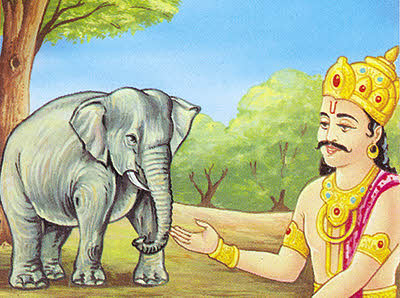
Then the thrones of all the Indras shook, as if to urge them in the business of the Master’s kevala-festival. The bells in the heavens rang at once with a penetrating sound, like messengers in the business of summoning their respective people. From the mere thought of the Lord of Saudharma wishing to go to the Master’s feet, the god Airavana, turned into an elephant, approached. With his body a lac of yojanas long he shone like Meru which had become alive, wishing to see the Master. Continue reading “Description of Airavana” »
Fourth Incarnation as Mahabala
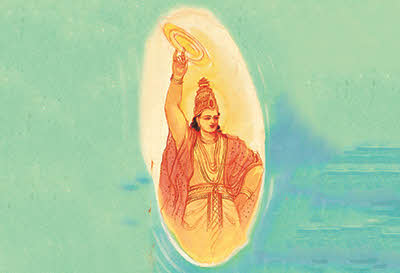
When he died from Saudharma, then he was born as a son of King satabala, the crest-jewel of the Vidyadharas, by his wife Candrakanta, in the West Videhas, in the province Gandhilavati, on Mt. Vaitadhya, in the country named Gandhara, in the city Gandhasamrddhaka. He was exceedingly strong, and was named ‘Mahabala’ because of his strength. Protected by guards and cherished, he gradually grew up like a tree. Gradually filled with all the arts, like the moon with digits, highly distinguished, he became a festival to the eye of the people. Continue reading “Fourth Incarnation as Mahabala” »
Refutation of the Carvaka System
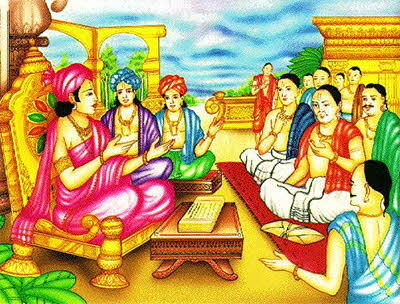
Then Svayambuddha said: “People, alas! are made to fall by the atheists who are enemies to themselves and others, dragged like blind men by blind. That the soul exists is known by its own perception, like pleasure and pain. From lack of superior proof, no one can deny it. ‘I am happy; I am unhappy this unrefuted conviction could not arise to anyone without a soul. When a soul has thus been proved in one’s own body from one’s own feeling, it is also present in other bodies from inference. Continue reading “Refutation of the Carvaka System” »
Second & Third Incarnation
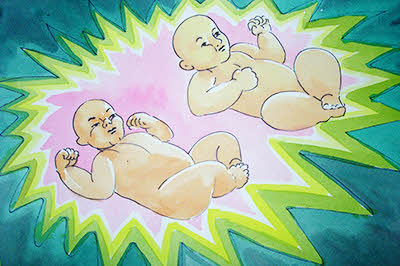
SECOND INCARNATION
As a result of his gift to the munis he became a twin in the Uttarakurus, who have the period of pure happiness present, on the north bank of the river Sita, to the east of the Jambu tree. There people wish to eat at the end of the fourth day, and have two hundred fifty-six ribs. They are born as twins, are three gavyutis tall, live for three palyas, bear children toward the end of life, have slight passions, and are free from self-interest. Continue reading “Second & Third Incarnation” »
The Gods – Their Cars – Their Bells their Family – Part 3
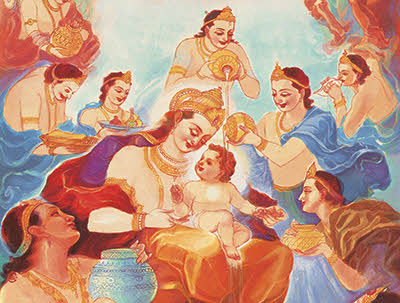
The Indra of Aisana made himself five-fold, like the King of Saudharma, and took the Lord of the Three Worlds on his lap. Of these, one held over the Lord’s head a camphor-white umbrella, giving a lesya of the quarters, as it were, with its swinging pearlpendants. Two others fanned the Lord of the Jinas with chauris dancing from joy, as it were, from the various movements of the body. Another, twirling a trident in his hand, went in front as if thinking to purify himself by the Master’s glances. Then the Indra of Saudharmakalpa created four tall bulls from crystal in the four directions from the Lord of the World. Continue reading “The Gods – Their Cars – Their Bells their Family – Part 3” »
Sermon – Part 2
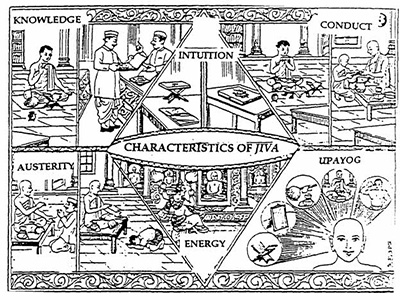
Good conduct is defined as the rejection of sinful activities. It is twofold: partial (desavirati) and total (sarvavirati).39 The five lesser vows (anuvrata), the three meritorious vows (gunavrata), the four disciplinary vows (siksavrata) are considered the twelve fold partial reduction. Among these, avoidance of injury, lying, stealing, impurity, and possessions in their grosser forms are called by the Jinas the ‘lesser vows.’ The three ‘meritorious vows’ are: the limitation of travel, the limitation of things of single and repeated use, and the limitation of purposeless injury. The four ‘disciplinary vows’ are tranquility, limitation to one place, fasting, and living like a muni, the distribution of alms. Continue reading “Sermon – Part 2” »
Thirteenth Incarnation – The birth of Rsabha
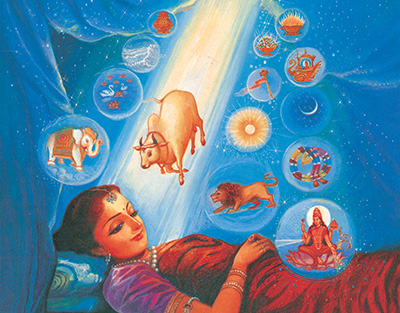
When there remained in the third spoke of time eighty-four lacs of Purvas plus eighty-nine fortnights, on the fourth day of the dark fortnight of the month Asadha, when the moon was in conjunction with the Uttarasadha constellation, the soul of Sri Vajranabha, after completing a span of life to the extent of thirty-three sagaropamas, fell from Sarvarthasiddhi and descended into the womb of Marudevi, the wife of Sri Nabhi, as a hansa would descend from Lake Manasa to the bank of the Mandakinis. Continue reading “Thirteenth Incarnation – The birth of Rsabha” »
Stuti
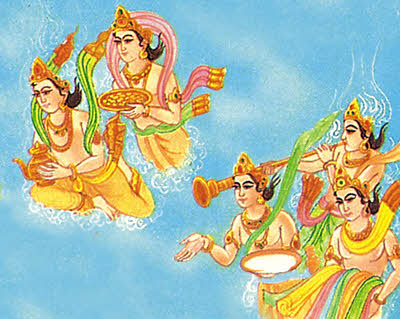
“Reverence to you, O Lord of the Congregation, Protector of the World, Ocean of Compassion, O Lord, son of Sri Nabhi. O Lord, you are resplendent with the three knowledge’s, sense knowledge, etc., innate, like Mt. Meru with the parks, Nandana, etc. O God, this zone of Bharata today surpasses heaven, since it is adorned by you, the crest-jewel of the three worlds. Like you, this day is to be held in respect throughout samsara, purified by the festival of your birth kalyana, O Lord of the World. From the auspicious occasion of your birth, happiness arose even for the inhabitants of hell. Continue reading “Stuti” »
Personal Description of the Lord
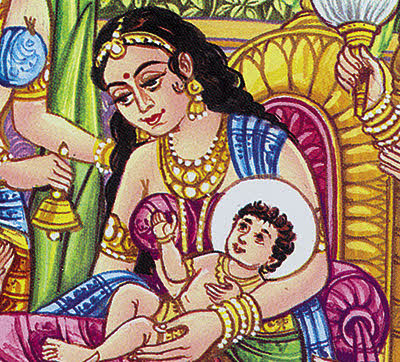
In youth the feet of the Lord were soft, red, like the inside of a lotus, warm, firm, free from perspiration, with smooth soles. As if for removing distress of those bowed (at his feet), the Lord’s cakra appeared, and the wreath, goad, and banner, like those of the elephant of Sri always present. The conch and the pitcher shone on the soles, and the svastika on the heels of the Master’s feet like pleasure-houses of Laksmi. Fleshy, round, high, like a serpent’s hood, the great toe of the Master was marked with a srivatsas, like a calf. Continue reading “Personal Description of the Lord” »









